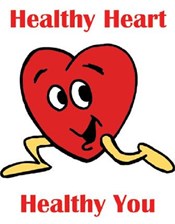Each year, February is reserved as American Heart Month in order to raise awareness about the prevention and management of heart disease, which is the leading cause of death in the United States in both men and women and accounts for almost 700,000 deaths each year or 29% of all U.S. deaths. Heart disease is a broad category referring to a variety of conditions, including atherosclerosis, ischemic heart disease, peripheral vascular disease, heart failure and hypertension. Present in nearly one-third of the American population, hypertension is, in fact, the most important risk factor for heart disease. Referred to as the "silent killer," hypertension produces no symptoms and, if left untreated, can lead to stroke, heart attack, heart failure, and kidney failure. Other risk factors for heart disease include high cholesterol, diabetes, obesity, cigarette smoking and living a sedentary lifestyle. But, there are ways to reduce your risk of heart disease by making simple life style changes.
Reduce intake of dietary cholesterol
Studies have shown that reducing levels of LDL (bad) cholesterol in persons without heart disease can reduce the risk and decrease the chances of developing heart disease later in life. The American Heart Association (AHA) recommends no more than 300 mg of cholesterol each day (limit 200 mg cholesterol for those with LDL levels of 130 mg/dl or above, which is considered to be borderline high). Dietary cholesterol comes from animal products like eggs, meats, butter, cheese, and whole milk. To put this into perspective, one large egg contains 212 mg cholesterol. For an alternative, one should try eating just the egg white, which contains essentially no cholesterol.
Limit fat intake
The AHA recommends limiting total fat intake to 25-35%, limiting saturated fat intake to less than 7% and limiting trans fat intake to less than 1% total calories. This means that in an average 2,000 calorie diet, you can consume 55-77 grams of total fat, 15 grams of saturated fat, and less than 2 grams of trans fat. Trans fat, also known as partially hydrogenated oils, are made during the industrial process to turn liquid oils into solids. One can reduce his intake of fat by choosing lean meats and cheeses, reduced-fat milk, and preparing food in ways other than frying.
Limit sodium intake
Both the DASH diet and the AHA recommend limiting sodium intake to 2,300mg a day to control high blood pressure. A simple way to cut down on salt intake is to avoid processed foods. They often contain large amounts of sodium to preserve shelf-life and add flavor. When possible, one should buy fresh or frozen fruits and vegetables rather than canned, as they often contain lots of sodium, and experiment with different herbs and spices that complement the dish being prepared. Using salt-substitutes like Mrs. Dash® is a great way to add extra spice without added salt.
Increase dietary fiber intake
Research has shown that certain foods high in fiber can help lower cholesterol and ultimately reduce the risk for heart disease. These foods include beans and grains such as oat, barley and psyllium. Fruit and vegetables are also a great source of fiber, and are naturally low in fat, cholesterol, and sodium. The recommended amount of fiber is 25 to 30 grams per day. One slice of whole-grain bread provides approximately 3 grams of fiber and one medium sweet potato with skin provides approximately 4 grams of fiber.
Increase fruits and vegetables intake
Fruits and vegetables play a crucial role in maintaining a healthy diet. They are packed with essential nutrients and antioxidants which aid in the disease-fighting process. The recommended daily intake is a variety of 2 cups of fruits and 2 ½ cups of vegetables for the average adult.
Stay active
Physical activity is not only important in the prevention of heart disease. It is important in the prevention of diabetes, high blood pressure and certain types of cancer, to name a few. It is also a great way to relieve stress and build confidence. To reduce the risk of chronic disease, it is recommended that you engage in physical activity for 30 minutes most, preferably all, days of the week. To manage weight, it is recommended that one engage in physical activity for 60 minutes most days of the week and 90 minutes most days of the week for weight loss.
So to live a heart-healthy lifestyle, just remember the basics: cut back on the foods that aren't good for the heart, like cholesterol, fat and sodium; incorporate the foods that are good for the heart, like dietary fiber, whole grains and fruits and vegetables into a daily diet; and incorporate at least 60 minutes of physical activity most days of the week. Also a regular visit to a physician is a good way for one to stay on track.







